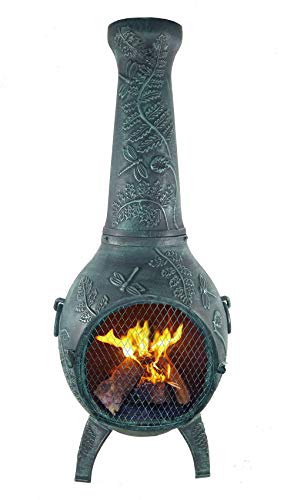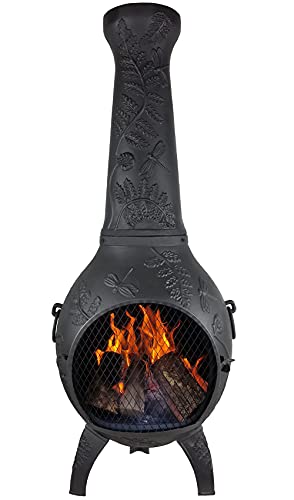What's The Job Market For Chiminea Fireplaces Professionals?
페이지 정보

본문
 Chiminea Fireplaces
Chiminea FireplacesFire pits are great but chimineas provide an entirely new dimension to fire pits in the backyard. These unique outdoor fire pits are works of art, providing warmth and ambience for family gatherings.
Chimineas must be kept outside, and they should never be placed directly beneath any flammable material. They also must be protected from rainy weather.
Safety
Whatever type of fire feature you select for your garden, it's important to be aware of safety precautions. Chimineas and fire pits could produce hot sparks that can cause burns. They also release a plume of smoke that could contain pollutants, including secondhand tobacco smoke. Ensure that the surrounding area is free of anything that could ignite and that the chiminea is located away from trees that are overhanging or eaves that could catch fire. Also, it's best to wear protective clothing when working with a chiminea especially if you are planning on cooking food on it.
While both chimineas and fire pits can provide warmth, entertainment and create a focal point for your outdoor space however, they differ in regards to the aesthetics and lifestyle requirements. Fire pits provide a more dramatic experience and can work with a variety of design styles. Chimineas are rustic and have a more traditional appearance that is perfect for smaller gardens. They require more care as they produce more smoke and require frequent cleaning of the ash.
Concerning the environmental impact is concerned, chimineas release less pollutant particles than traditional fireplaces made of wood since they use dry, seasoned, and more smoky wood that results in fewer emissions per use. Both kinds of fire pits, can release a significant amount of air pollutants in the form smoke that is contaminated by a variety of harmful chemicals.
When setting up the chiminea, make sure to use only wood that is seasoned and keep the burning flames to a minimum. It's recommended to put a mesh-screen spark arrester at the top of the chimney. A spark arrester can help reduce the creation of unwanted sparks that can ignite grass fires or spread the fire to nearby material that is combustible. It's a good idea to avoid extinguishing a chiminea using water as the sudden change in temperature may cause cracks in clay, terracotta or metal.
Chimineas and fire pits should be placed on surfaces that are fire-safe like pavers, concrete bricks or slate tiles. It is recommended that the chiminea be at least ten feet from any structure or combustible materials. It's also a good idea for homeowners to purchase an hose or water container so they can quickly extinguish any accidental fires that may become out of control.
Style
Chimineas remain popular among homeowners, even though fire pits are becoming more popular. They can add an old-fashioned, Mexican feel to your patio and garden. They also provide warmth during the winter months. The dimensions of your outdoor space and the kind of fuel you prefer will determine if you opt for an chiminea or a firepit.
Chimineas come in a variety of styles, ranging from the classic terra-cotta rounded design to more modern chiminea metal options. Some allow burning wood instead of gas, which is a great alternative for when the weather is cold or it is too windy to have a fire.
Traditional chimneys have a base that houses the firewood that is pushed in from the front. The chimney neck is extended upward directing smoke up and away from the house to keep drafts out and reduce the amount of soot that would otherwise get into your food or onto your body when cooking.
 Clay and terracotta chimineas can be damaged when they get too hot. They work best in areas that are protected from the elements. Steel and cast iron can withstand heat, but are heavy and difficult to move.
Clay and terracotta chimineas can be damaged when they get too hot. They work best in areas that are protected from the elements. Steel and cast iron can withstand heat, but are heavy and difficult to move.A chiminea that is wood-burning can be an excellent addition to your patio, particularly when you have plenty of open space to place it. Remember that chimineas require a lot of space to smoke. They should be placed away from other structures or seating areas so as to prevent damage.
It is possible to choose a chiminea that is made from clay or metal. It can be painted or appear natural. If you choose an a metal chiminea, it is likely to have an anti-corrosive coating that helps to keep rust at bay. Some even have the black color for a contemporary look. You can select a model with natural rust patina. This occurs when the metal is exposed.
Fuel
Chimineas make the perfect focal point for patios that have a smaller size. They have a wide base that tapers to smaller chimneys. With a variety of materials and handcrafted detailing These fireplaces enhance the look of any deck or backyard providing warmth and ambiance to any outdoor living space.
Unlike traditional wood-burning fireplaces, which emit a great deal of smoke and can pose health risks, chimineas are designed to minimize unwanted emissions. The enclosed design and upward-directed fireplaces cut down on smoke, reducing environmental concerns and complaints from neighbors. This is particularly important when you live in an urban area where smoke pollution can create problems for other residents.
Chimineas are usually designed to burn treated or seasoned wood, although there are models that can accommodate propane gas and charcoal to provide a variety of cooking options. If you decide to use fossil fuels like coal, you'll need to watch your fuel to make sure that it doesn't produce too much smoke.
As with fire pits, Chimineas can vary in size, but there are designs that work with standard logs, and even larger pieces of wood for grilling purposes. Certain chimineas come with features such as a rain cap, grilling grate or screen to protect the chimney from falling sparks and debris. Certain models, such as this one by Bali Outdoors include a screened opening and steel pokers to help ignite the fuel safely.
There's a chiminea for any style, whether you prefer a modern or rustic style. There are chimineas that have detailed or engraved designs as well as traditional models. Certain manufacturers, like the Blue Rooster Company that makes our top pick, even provide conversion kits to transform chimineas that burn wood into gas-powered options.
The choice of the right chiminea is crucial for a relaxing and safe garden experience. To determine which option is the best fit for you, take into consideration your lifestyle, your preferences for aesthetics and the dimensions of your garden. Be sure to prioritise safety features and maintenance requirements when you shop and think about your budget to ensure you are able to enjoy your chiminea year-round.
Maintenance
Despite being easy to use, chimineas near me require some care to ensure that they last for a long period of time and are safe. Cleanliness of your chiminea helps prevent the buildup of ash and other debris which could lead to fire hazards and structural damage. Regularly cleaning the appearance of your outdoor fireplace and rustic appeal.
Gas models can be converted to burn natural gas or propane. To prevent carbon monoxide poisoning it is essential to keep the chimney free of flammable materials such as leaves and twigs when you use a gas-powered chiminea. It is also important to only burn dry well-seasoned wood in your gas chiminea as treated or painted materials release harmful chemicals when they are burned.
It is recommended to line the clay chiminea's bottom with pea gravel or rock sand. This will prevent the clay from cracking when heated by a large chiminea flame. It is also advisable to place an aluminum or slate stack cover on top of the chiminea to protect it from rain. Chimineas are made to be cured or broken in slowly by starting small fires and growing in size over time. After three to four small fires, your chiminea should be ready for full-sized logs.
It is essential to be aware of local laws regarding burning when using your Chiminea. Be especially cautious during drought conditions, as the continuous smoke from a chiminea can cause your neighbors to get upset or ask you to remove your fires.
Both chimineas made of steel and clay can break or crack when the weather is too hot or cold, however steel structures are more likely to suffer from corrosion and rust than ones made from clay. A high-quality, long-lasting chiminea can ensure that your outdoor fireplace will last for a long time to be.
When using your chiminea, it is recommended that the grate is filled with about 3 inches of pea gravel to prevent the fire from spreading too fast and posing a fire risk. It is also a good idea to put your fireplace so that winds will blow away the smoke and not blow it into your home. The constant flow of noxious gases could cause issues.
- 이전글How Chiminea Outdoor Is A Secret Life Secret Life Of Chiminea Outdoor 24.10.21
- 다음글The Reasons To Focus On Improving Buy Espresso Machine 24.10.21
댓글목록
등록된 댓글이 없습니다.


